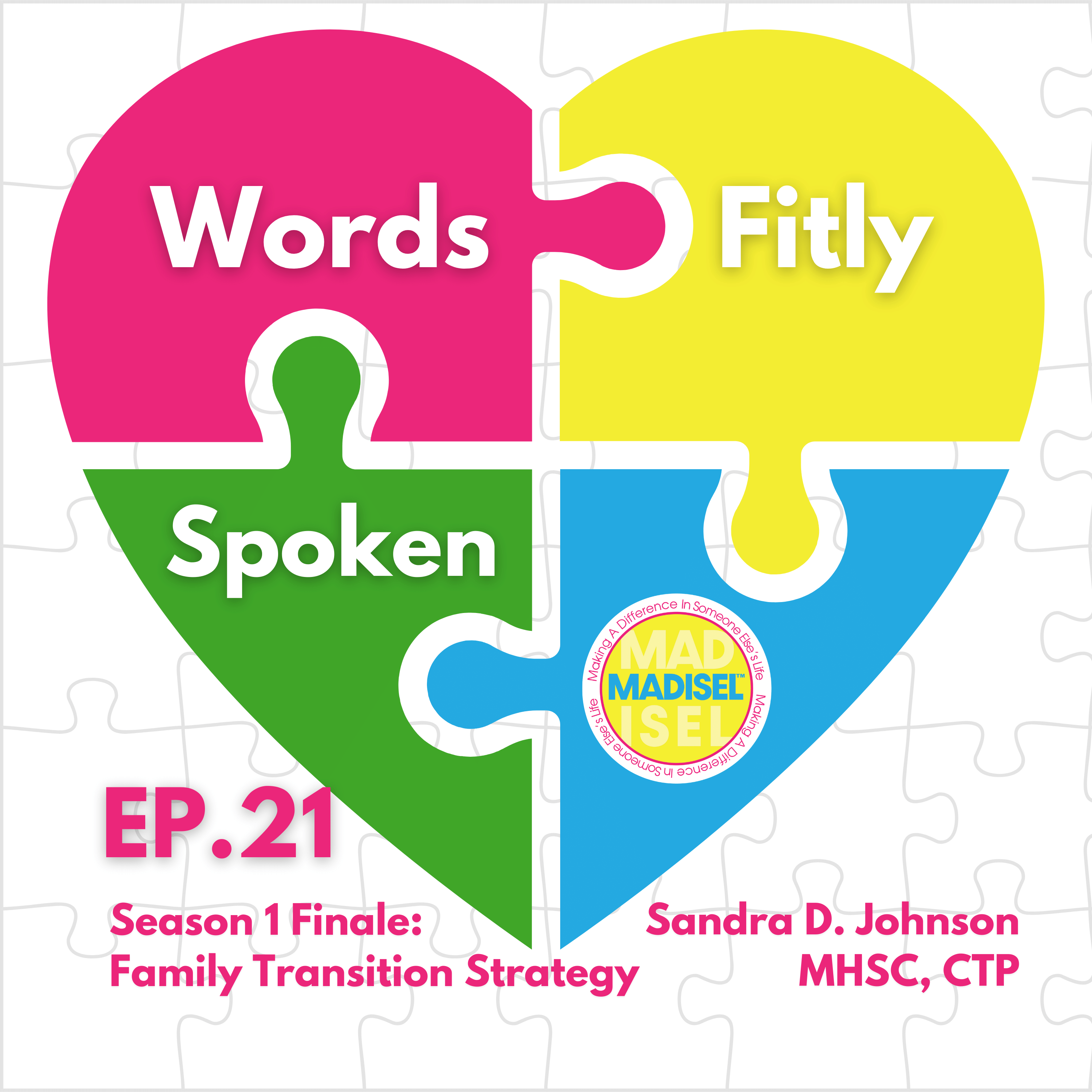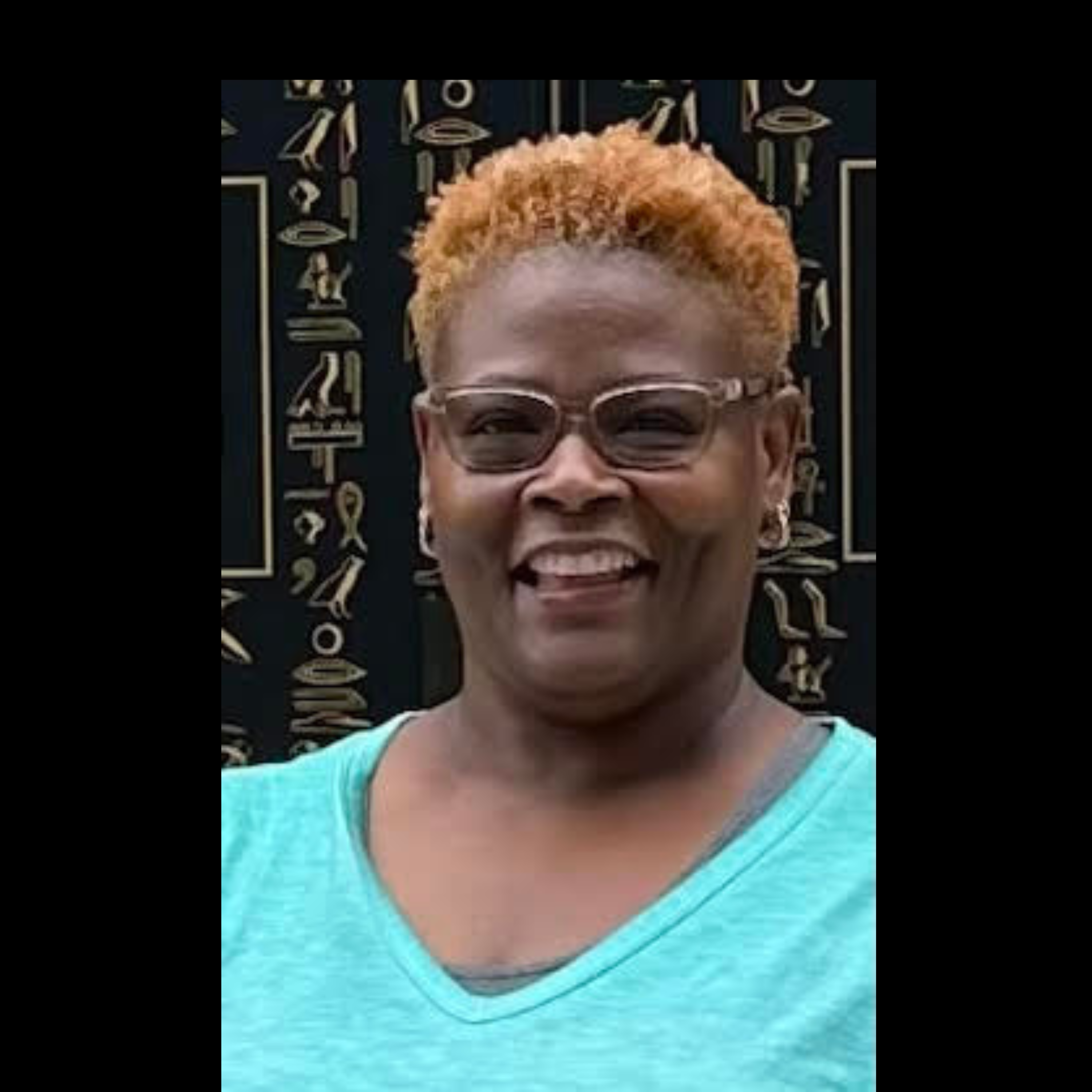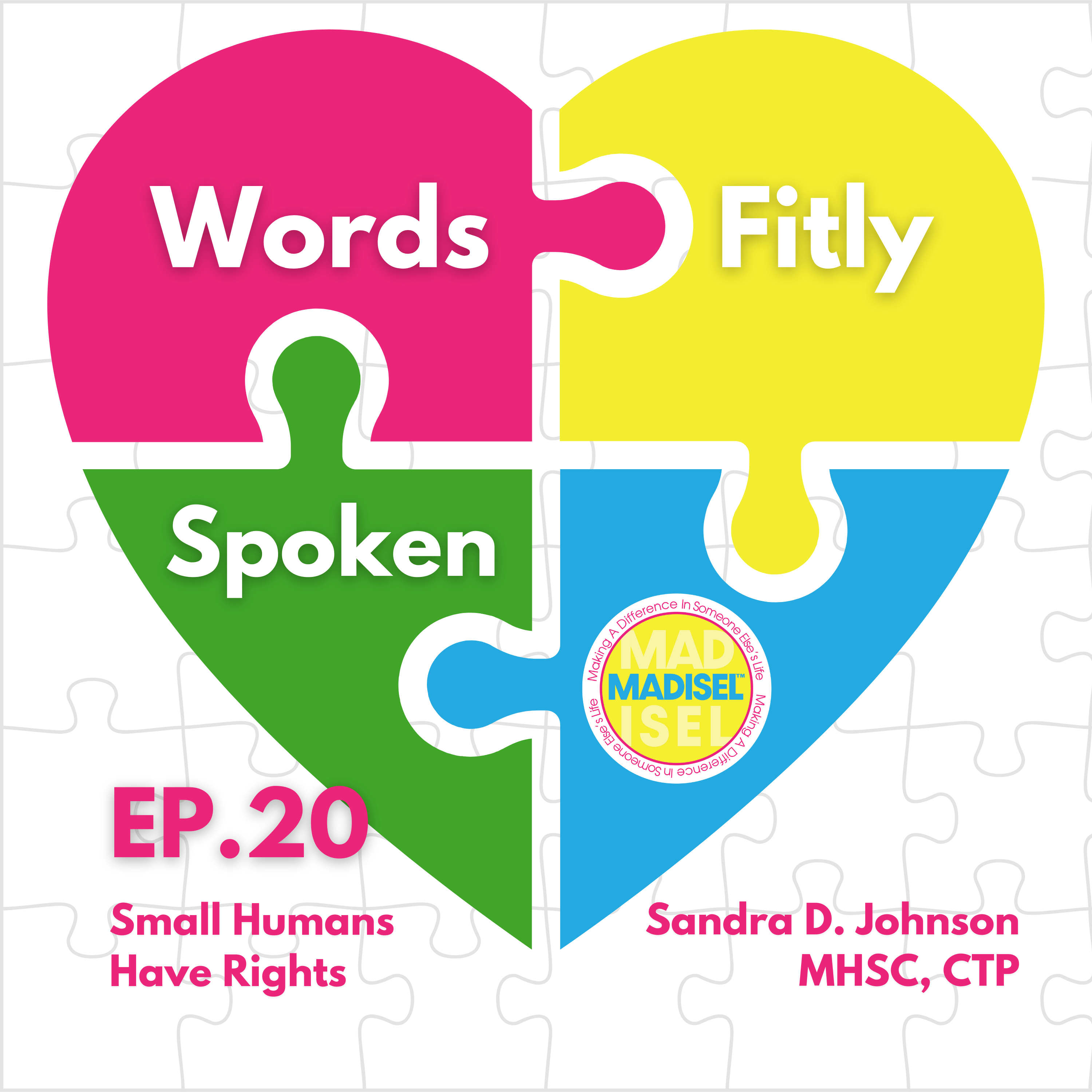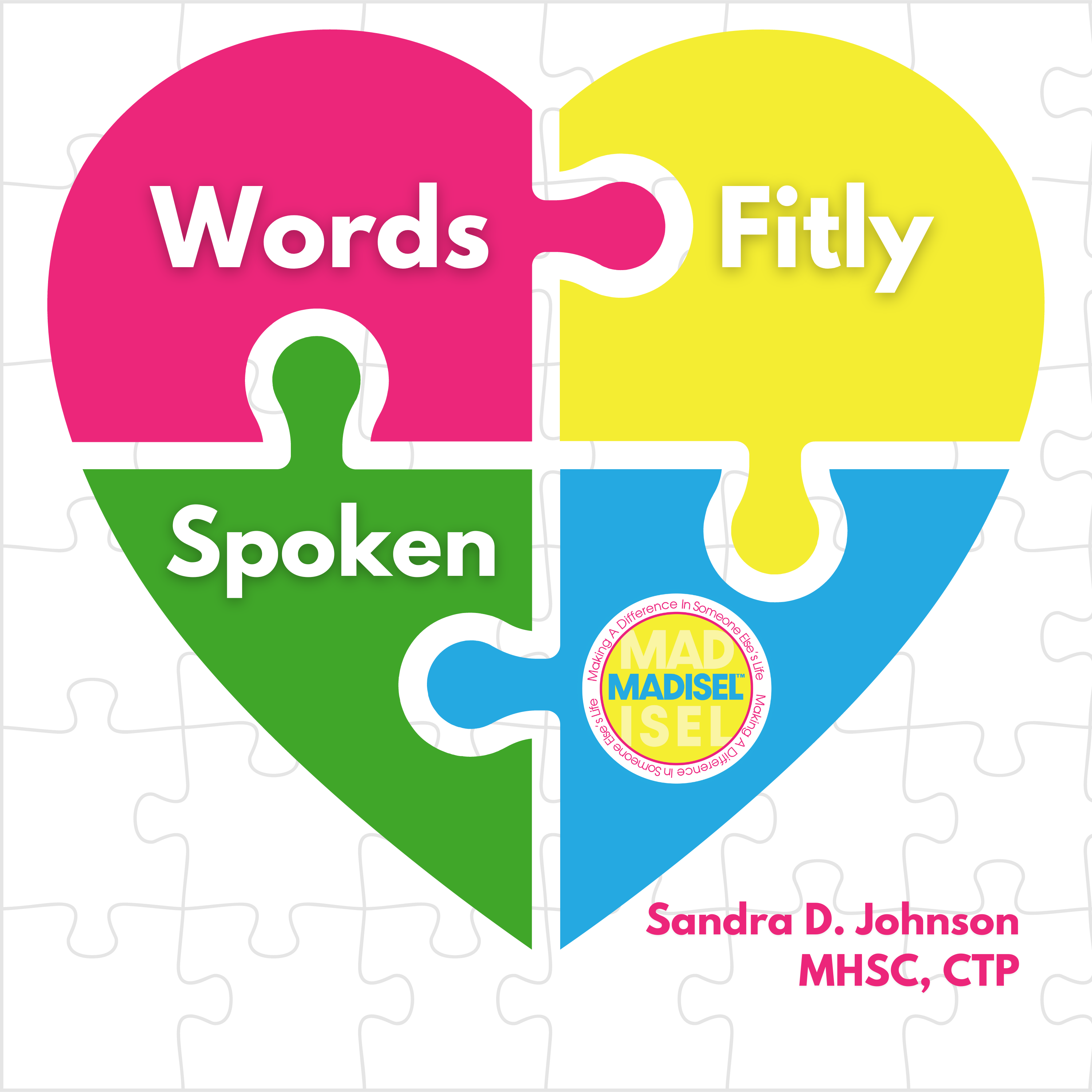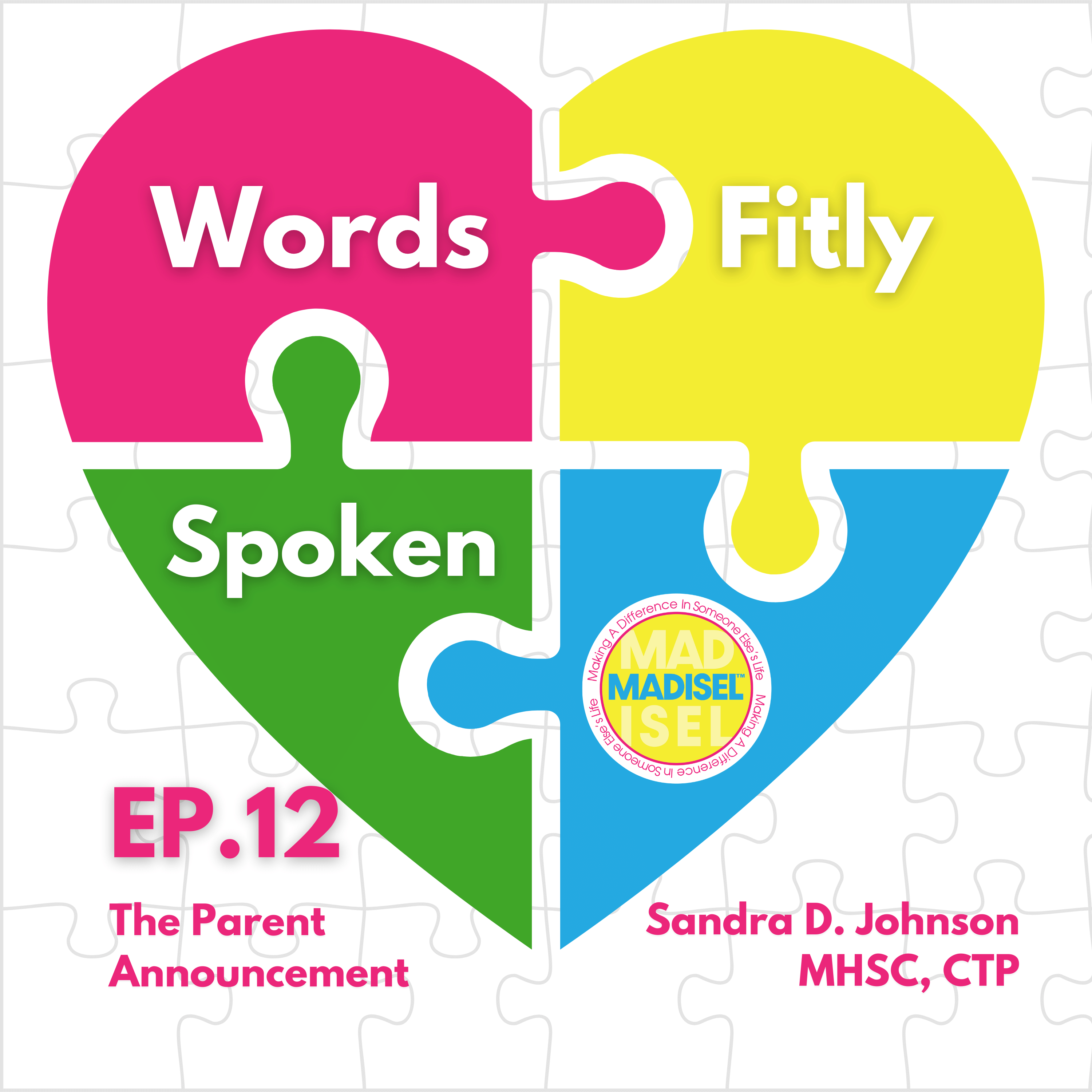The importance of breathing for survival and clarity of thought will support our journey of emotional and mental wellness. In this season finale we bring several thoughts together that support a family transition by learning to collaborate. Let’s discuss our attachments, fears, and the mishandling of our parental positions. Tying together several loose ends to build a strategy of empowerment!
View Full Transcript
Episode Transcript
Welcome to at MADISEL Coach and MADISEL TV's Words Fitly Spoken podcast. Hello there. I'm Coach Sandra, and I'm the host of Words Fitly Spoken podcast. Words Fitly spoken are words spoken at the right time for your encouragement and enrichment. On this podcast, we will deal with emotional and mental wellness by talking about the conflict. We have in our everyday relationships, whether at home, work, school, and the community. Stop in to hear some helpful words that create awareness about your emotional health.
Hey everybody. Thanks so much for stopping back in. This is Words Fitly Spoken and I am family coach Sandra. You guys who have hung in here with us throughout this whole season.
We are so excited that we are doing a special Words Fitly Spoken season finale. You heard it. That's right. This is the season finale. We're excited about this one where we're going to try to tie together. a lot of the thoughts that we have talked about throughout this season. So we're calling this one the family transition strategy, right?
A family transition strategy where we may put a few extra things in this episode that you didn't see throughout the season because we want to really drive home some key points. As we wrap this season up, um, with a big old bow, because I don't know if the bow is going to be neat, but it's going to be big.
And, uh, we talk about family transition. You might see some pictures of oxygen masks. So I want you to think about an oxygen mask when you're listening to this one. So, I'll start it out by saying the cabin pressure has changed. An oxygen mask has been deployed. Now, why do you need this oxygen mask? That's a great question.
We need you to survive and we need you to think clearly. Oxygen flowing freely should help us think clearly. At least that's what we're told, right? As adults, we must lead well. and follow wise. I'll say that again, as adults in these relationships that we're having with young people, no matter if we're parents, if we're teachers, we are instructors who work with young people, um, in a work, uh, resource, any situations like that when you are connected with other people, we have to lead well, I choose to lead well and I choose to follow wisely as children get older.
The relationship has to develop into a partnership between parent and child instead of a dictatorship. A partnership. Yes. Like in business. So what would it look like if you actually ran your home like it was a business. You saw that young person as someone who contributes to the household. They contribute to the family that they are actually givers and not just takers.
You see, um, a strategic parent is going to build a collaborative relationship. I call it CR, a CR. So CRO stands for collaborative relationships. These, um, are produced or conducted by two or more parties. You work together to establish unity and connection for your overall wellness. Wow. So we're going to come together on this.
We're going to, we can even come together and not even agree with each other. Yes. Even though it sounds impossible, it is possible. Presently, as I'm working and engaging in different situations throughout the community, I find it rare to find a family who is in collaboration. You see, collaboration requires an acceptance of equality.
In the home for all the parties. So it doesn't matter about your age. I see you as an equal contributor. I see you as an equal human. You don't give the same things, right? So equality is not saying that, uh, Everyone makes the same financial decisions, no matter what their age is or their, um, investment in the family.
No, it means you have different responsibilities. You have different roles that you play. So equality doesn't mean you have the same role. You can be equal and have different responsibilities in different roles. Everyone has different roles and responsibilities, no role or a positional title. should make a person have greater or lesser value.
And that's where I see the problem happening. We, without even owning it, we will give value or we, or we take away from the value of someone because, well, they're not called a parent, so they're not as important in our house. That's not healthy. The young person is just as important as the parent.
Everybody in the family is just as important. So we can't stay so connected to these titles that the titles blind us. There's something to consider and we can build a new podcast on that later, but stick with me on this. Like, so no one is greater. No one is lesser. Everyone is equal in your home. If you want to have a family transition, strategy.
It's going to start with that type of thinking. The strategy involves that type of thinking. Children need to understand equality in the home before they, uh, will start demanding it or expecting it from their community. Equality means that we're same in humanity, but we're different in responsibility. I don't know if I can say that enough because I see that it's a major misunderstanding or lack of understanding or refusal to understand.
One of those three categories. Adults should not be fearful of exercising equality in the home and that's what we find that some adults are just afraid because they're so attached to a title. a position. You've heard in another podcast, we talked about the announcement of I am the parent. No one in the room's really confused about it, except sometimes the parent.
So we as the adults cannot be afraid of losing our parental position. The position I believe is a gift from God. Now, if you think you got yours out of a. Cereal box. Work with that. Work through it. I don't know, but I think it's a gift. It's a gift to be a parent. Everybody doesn't get to be a parent.
Everybody doesn't get to have that position. How do you view the position of parenting? You've gotta, you gotta wrestle with that. Again, these are things that are, that are really affecting our emotional and mental health because we don't stop to deal with it. We just, we attach ourselves to a title and we just walk through earth and everything we think is going to fall into place and we never stop to process it.
We don't stop to, uh, meditate on it, discipline ourselves to understand it better. Consider this, a parent is a temporary guide. building a lifelong bond and relational connection with another human, not a lesser human, just a different human. This bond and connection looks different for every relationship, by the way.
So if you're trying to model your parenting on, well, this is how my parents did it. Please remember that was before all of the technology that you presently have that your children have in their pocket. or close by their bed.
Don't try to copy what someone presents as an example. Every human is unique. Every relationship is also unique. It's a part of my, um, My communication that I explained that we hear the statement that children don't come with manuals. And I will say, yes, they do. They each are their own manual. So every child in your home is a manual.
Study it. Listen to it. Learn from it. Stop ignoring it.
Again, every human is unique, beautifully unique, by the way, every relationship is also unique. The family unit titles, right? We have these titles in a family, mom, dad, grandparents, aunts, uncles, all of those titles are only in jeopardy when the job requirements are not being properly fulfilled.
is a gift and an honor. But we each must put in the work. You must put in the work. In many cases, these title positions will represent the keepers of the village. Right? You know, we talk about I talked about in another podcast, you know, it takes a village and I say, no, it takes the right village, right? The right village people.
Um, so you're the keeper of the village if you can have these titles and the villages where the children and the young people, they require stability, safety, fun. Yes. I said the three letter F word. Fun. It needs to be okay to have it near you. And freedom. Okay. Fun and freedom. You start out being, here's something amazing.
I don't know that we even process this a lot. When that little one enters the universe, you start out being the number one influencer for your child. And then things begin to change. You weren't expecting this. And they begin to change quickly, especially now that we live in this instant digital world. As children get older, your influence will be challenged because many voices have entered the world of their thinking and their entertainment.
Alexa, Siri, and Google are now household names. And in some homes, this might be the number one name that a child is calling on. What? Yes. These are facts.
Again, the cabin pressure has changed. An oxygen mass has been deployed.
Some of these voices are invited by you. And some come because the child invited them and the others come because of the society and the community that we live in.
Some of these voices, guess what, are going to be pushy and intrusive. They come with wrong intentions. They come with their own agenda.
And they come through social media paths. They come through gaming systems. They come through text messages. They come through friends I met online. I don't know if they're really real humans. Or if they're the age that they say they are. You have all of these different voices. Some of them are pushy. Some of them are intrusive.
Hey, even the pushy and intrusive voices can be family members. Let's go ahead and put that out there. So village keepers watch, listen and evaluate the family environment. As the children get older, the collaborative relationship was what we're talking about. We're talking about a partnership. The collaborative relationship, it will welcome them into the process of protecting themselves and others in that family unit.
This contributes to children and young people learning about empathy, awareness, love, and responsibility. By the way, these are key things that need to be learned at home. Empathy, awareness. love and responsibility. Stop waiting for schools to put that in your young person. Stop waiting for the church to put it in your young person.
Stop waiting for anything else to do this. This is something that as the parent, the person who is carrying this major, major responsibility, major load, big title, hardly appreciate it. Please make sure they're learning about empathy, awareness, love and responsibility. And if you don't know it, you learn it, and then teach it to them as you learn it.
There's nothing wrong with that. You see, the fight is going to be different in an environment of collaborative relationships. The fight is different. Instead of constantly fighting each other, demanding your way, Parents do it and the children do it as well. Instead of fighting each other and demanding your way, the energies that would be in that fight are placed on building creativity and resolutions all around the family.
Creativity and resolutions. When there's collaboration, An enemy cannot create chaos and division in your family. And I'm seeing chaos and division in a lot of homes, a lot of homes with younger children, teenagers and young adults, a lot of chaos and division. It's because there's no collaboration.
There's no together. There's, there's no unity. They're not building anything together. They're fighting each other and they don't see that the, the enemy that has come in there, you've given them space to make it so much division and chaos to happen. So character development, is also something that will be welcome in a collaborative relationship.
And so I talk about like, are we teaching this younger generation about character where there's no space to teach about character because you're putting so much energy into a fight. So I can't talk to you about determination and wifi. And why are you on a game at two in the morning? You, your body needs sleep. So character character development is very important and so it's going to be valued instead of avoided when there's a collaborative relationship. Please remember the cabin pressure has changed and oxygen mass will be deployed.
You need oxygen to survive and to think clearly. Remember, a strategic parent builds a collaborative relationship. A collaborative relationship is about producing or conducting something between two or more parties, choosing to work together to establish unity and connection for overall wellness.
Overall wellness is everybody is well. If I eat, we all eat. Everyone is well. If we hope to move beyond seeing our children just housed, that means they're existing without connection or belonging. Instead of home, that means they have a sense of belonging and security. We have to do something different as the adults.
Instead of just saying, I'm the parent, we must welcome equality and build collaborative relationships with our new generations. As adults, you see, we're influencing our future leaders. They're not just future leaders. They're also decision makers. Therefore, as a leader. We influence the next leaders. That shouldn't be profound.
It's beautiful as leaders. If I see myself as a leader, then I'm influencing the next group of leaders.
But here's the thing. If we do not see ourselves well, we will definitely not see the next generation. Well, we have to lead well. Lead well and follow well. Lead well and follow wise.
Choose to subscribe to that.
That's the ending of our season. Thank you so much for coming through, investing your time, investing your thoughts, investing your comments, if you left us any. Thanks for sharing us. For those who are doing that, we are excited to be closing out this season with you and we hope that you will listen, relisten, that you will continue to share our podcast with other people who are in need.
Because we're not just talking about families, I'm talking about those who have ever been in a family of any type. We've got to process the things that we've, we've heard the things that we might be carrying to the next generation. Instead of just making the blanket statement of, I don't want to be like my parent.
Um, how about we think about how we're going to be and start processing that with some, some new words, some new thinking so that we can have some new behaviors. Thank you. Because we're repeating a lot of old stuff and, uh, it's really hurting our emotional and mental wellness. Don't forget to subscribe.
Don't forget to comment. Don't forget to hit the like button wherever you're watching and listening to this. Again, we appreciate you. Take care of your emotional and mental wellness by thinking about how you think, the words you speak. Remember a change in your thinking will produce a change in your behavior.
Bye bye.
